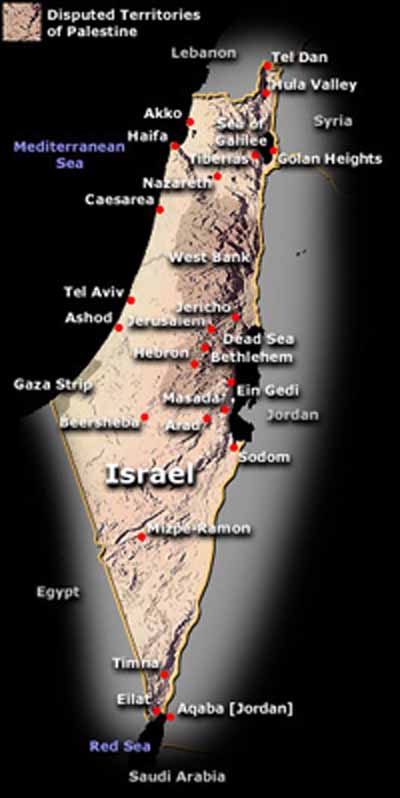Israel and Palestine
Information taken from The Road to Peace, csmonitor.com

Though neighbors have challenged its right to exist, Israel seems assured of its sovereignty. The more pressing question of statehood refers to the Palestinian homeland. Three million Palestinians currently live in "autonomous regions" within the Gaza Strip and the West Bank, areas which Israel occupied in 1967. Agreements between Israel and the Palestinians created a Palestinian Authority which has varying degrees of control over these areas, but not full self–determination. The agreements left Palestinian statehood to "final status" negotiations, which have never begun.
Israeli position:
For most of its history, Israel perceived the creation of a Palestinian state as a direct threat to its security. (Arabs have declared war on Israel three times since its founding in 1947.) Though former Israeli Prime Minister Ehud Barak made an unprecedented offer to support a state of Palestine, current leader Ariel Sharon remains opposed to the idea. Pressure from the Bush administration – which has now started to advocate a two-state solution to the Mideast conflict – might compel Israel to recognize Palestine. But borders are important. Israel will insist on a map that preserves its security, its settlements, its control of Jerusalem, and its access to water – much of which comes from the West Bank.
Palestinian position:
The Arabs rejected the original UN plan for Palestinian statehood, and the Palestinians never made much progress towards their goal until Palestinian Authority leader Yasser Arafat signed peace agreements with the Israelis. The 1964 Palestine Liberation Organization charter called for Israel's destruction, and replacement with a Palestinian state. Now disavowing this claim, Palestinian leaders insist that their state should include only the Palestinian territory occupied by Israel in the 1967 war – Gaza and the West Bank, including East Jerusalem. But Palestinians themselves are divided over their aims and methods. And so long as militants mount their campaign of terror, Israel will be more inclined to wipe out Palestinian infrastructure rather than support statehood.
Refugees:
In the Holy Land, exodus follows genesis. Israel was founded by refugees returning to an ancestral home. In the process, hundreds of thousands of Palestinians fled, or were ousted, from the new state. Today, millions of Palestinians living outside Israel (often in refugee camps in neighboring Arab countries) claim land or property inside the pre-1948 borders of the Jewish state. A United Nations resolution resolution recognizes this right-of-return, but Israeli law does not. The question of how to resolve this claim remains a chief obstacle to Mideast peace.
Israeli position:
Aside from being a logistical nightmare, granting right-of-return would dilute the Jewish population and threaten Israel's identity as a Jewish state. Though saying their refusal is "nonnegotiable," Israeli leaders have floated the idea of repatriating a symbolic number of refugees, and compensating the rest. Israelis also point out that after 1948, Arab states expelled their Jewish populations, and Israel resettled the refugees instead of putting them in camps.
Palestinian position:
Many Palestinians have maintained old deeds to property as family heirlooms, passing down the dream of returning from generation to generation. The issue goes deeper than individual property claims for the Palestinians, who feel a collective right to their ancestral homeland and a deep anger at those who drove them from it.
Jerusalem:
Jerusalem is sacred ground for three major religions – Christianity, Judaism, and Islam – making discussion about control over the city particularly testy. The United Nations originally called for Jerusalem to be an international city shared by Israelis and Palestinians. Arabs and Israelis fought bitterly over the city in 1948, and the Jordanian army conquered East Jerusalem (and the city's holiest areas) and expelled its Jewish population, while the Israeli army held on to West Jerusalem. In 1967, the Israelis conquered East Jerusalem and later annexed it to Israel proper. At the 2000 Camp David talks, there were for the first time direct negotiations over the fate of the city, but each side is adamant that the city must be its capital.
Israeli position:
Jerusalem is far and away the holiest city for Jews. Israelis consider the whole of Jerusalem to be the symbolic heart of their state. Israel claims Jerusalem as its capital, though most countries instead recognize Tel Aviv as the seat of government. For most Israelis, the option of partitioning the city again is totally unacceptable.
Palestinian position:
Jerusalem is Islam's third-holiest city and the idealized future capital of the Palestinian state. Palestinian historical and religious claims on parts of the city are deeply rooted. But Yasser Arafat has recently suggested that East Jerusalem could serve as the compromise capital.
Settlements:
Close to 400,000 Israelis live in Gaza, the West Bank, and Arab East Jerusalem. These illegal outposts developed after Israel seized Arab land in the 1967 war. Originally seen as a bargaining chip for peace and a security buffer for Israel, they've become an aggravating factor in the Palestinian intifada, and often the scene of violence. A US commission led by former US Sen. George Mitchell recommended in 2001 that Israel freeze all settlement activity. Neither side is willing to consider Jewish settlers living under Palestinian rule.
Israeli position:
For Israelis, settlements have helped both absorb Jewish refugees (from the Soviet Union, for example) and provided a first line of defense against the Palestinians. Israel has retained authority over 60 percent of West Bank territory. Many Israelis consider the settlements perfectly legal: they say no one has the right to stop Jews from living within Israel's biblical borders.
Palestinian position:
Settlements are a sore point. These Jewish oases in the middle of Arab territory, developed illegally and tacitly condoned by the United States, are seen an instrument of ongoing occupation and threat to the Palestinians. The settlement question becomes even more crucial within the framework of a proposed Palestinian state, as it will either have to exclude the settlements, or include provisions for the Israelis to leave their new homes.
